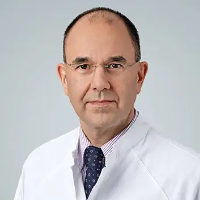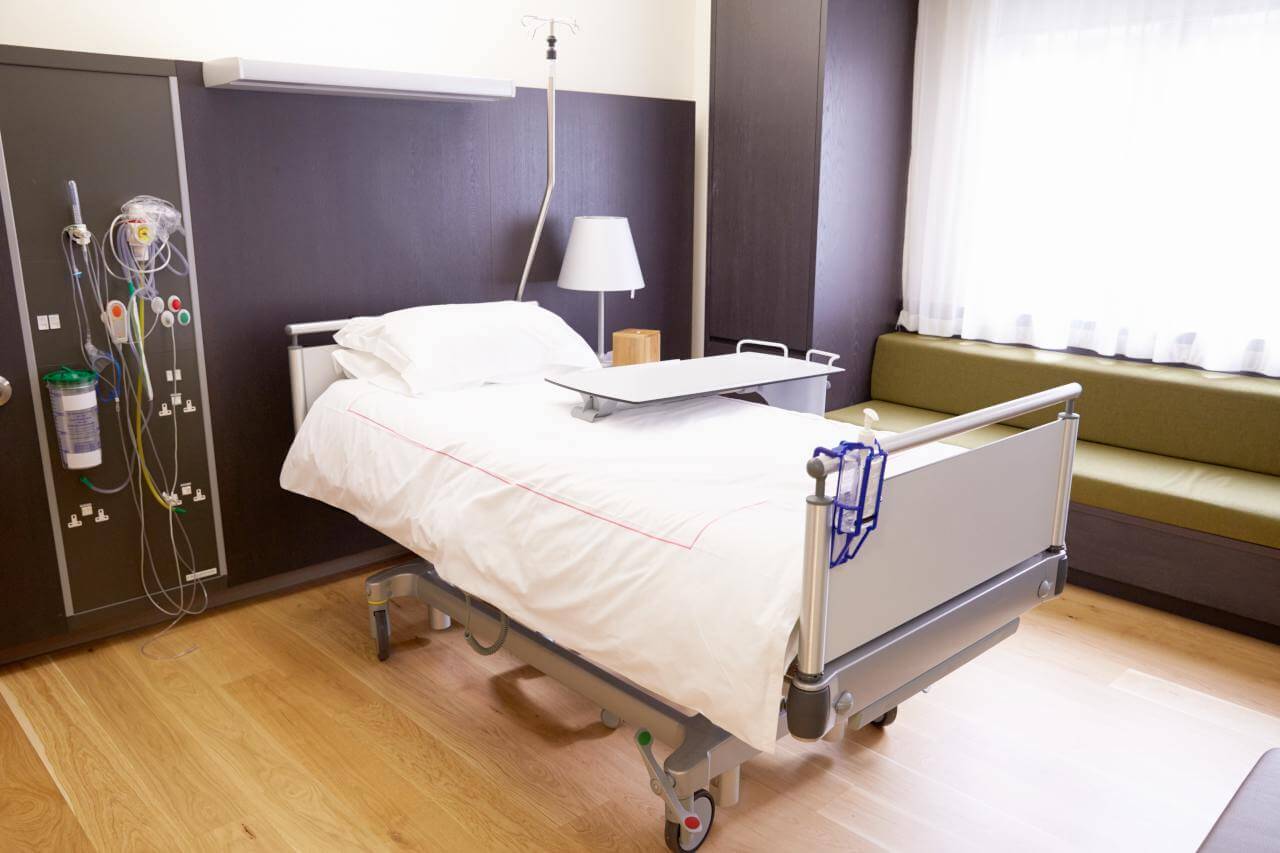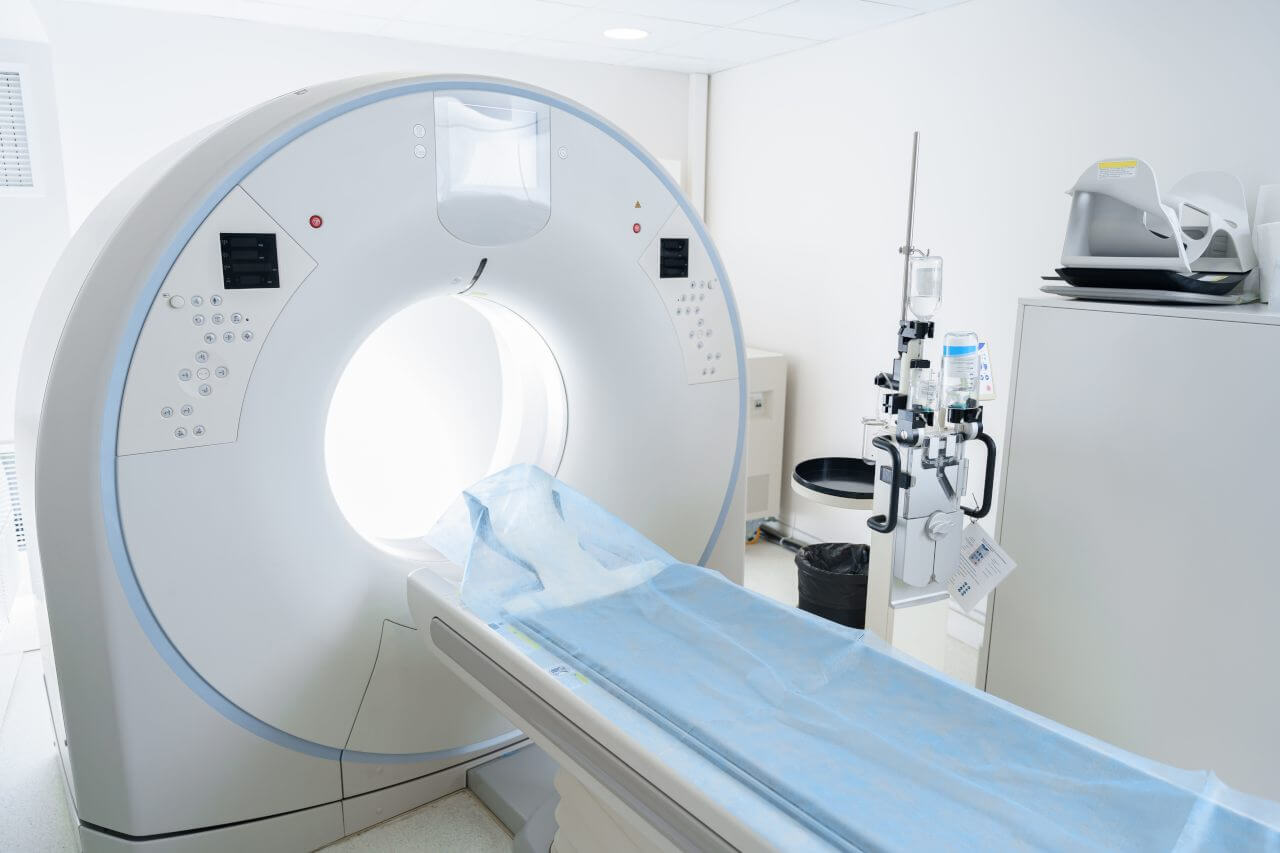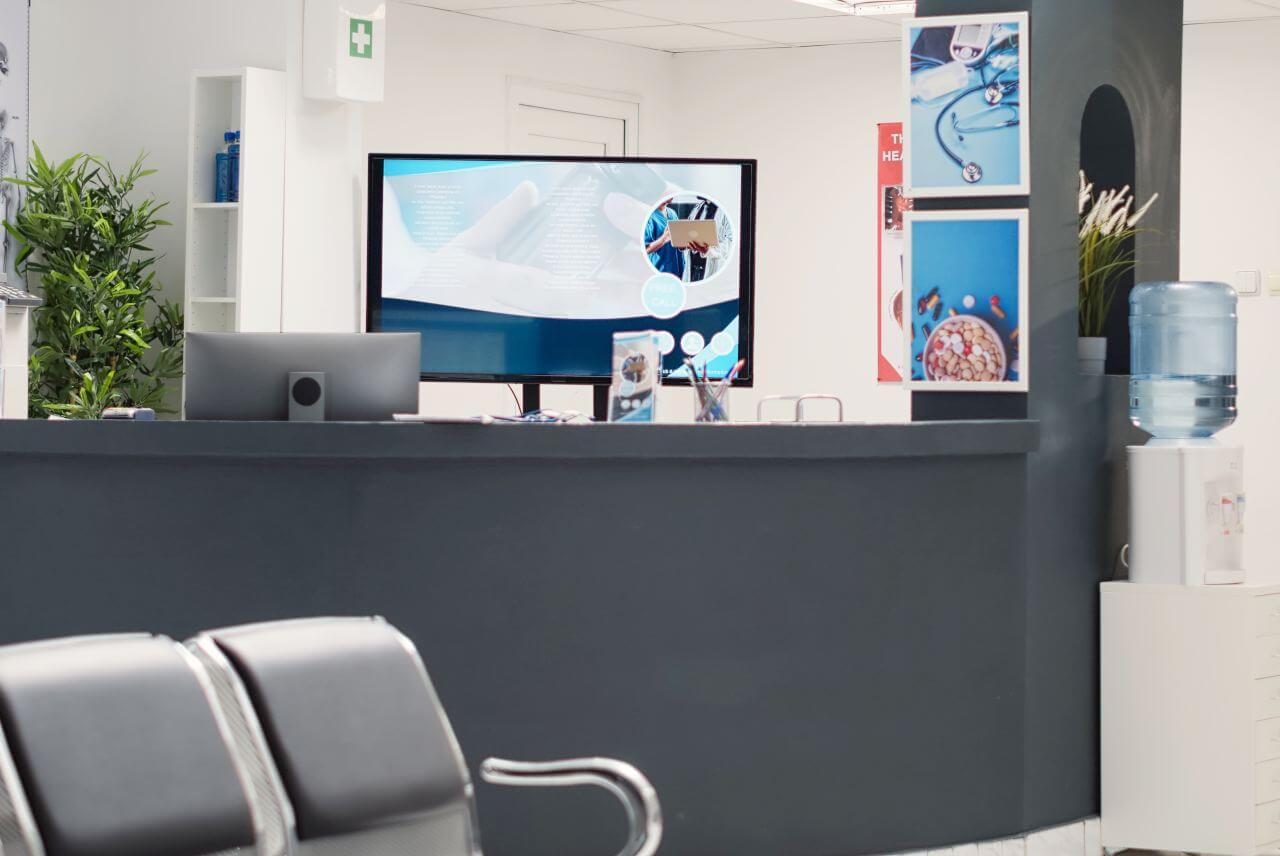
The program includes:
- Initial presentation in the clinic
- clinical history taking
- review of medical records
- physical examination
- urological examination
- laboratory tests:
- complete blood count
- general urine analysis
- biochemical analysis of blood
- inflammation indicators (CRP, ESR)
- indicators blood coagulation
- tumor marker, PSA
- ultrasound pelvic rectal/ abdominal
- preoperative care
- Greenlight Laser treatment of the benign prostatic hyperplasia
- symptomatic treatment
- control examinations
- the cost of essential medicines and materials
- nursing services
- full hospital accommodation
- explanation of future recommendations
Required documents
- Medical records
- Ultrasound scan/TRUS (if available)
Service
You may also book:
 BookingHealth Price from:
BookingHealth Price from:
About the department
The Department of Urology at the Vitus Clinic for Innovative Cancer Treatment offers advanced diagnostic and treatment methods for prostate cancer, bladder cancer, and benign prostatic hyperplasia. The key area of the department's specialization is prostate cancer treatment using irreversible electroporation (IRE) and photodynamic therapy (PDT). It is the only department in Europe where more than 1,500 irreversible electroporation procedures for prostate cancer have been successfully performed. This procedure is an excellent alternative to the classical treatment method for this type of oncology, a prostatectomy. The IRE technique demonstrates excellent success rates, while the risks of urinary incontinence are completely eliminated, and erectile dysfunction may potentially occur in only 3-5% of cases. It is impossible to achieve such outcomes with standard treatment approaches. The department has also gained unique experience in performing photodynamic therapy for prostate cancer and bladder cancer. Innovative methods such as immunotherapy and electrochemotherapy are widely used in the department to combat cancer. The treatment of benign prostatic hyperplasia with the GreenLight laser and the Rezum device complements the department's therapeutic offer. The department's doctors prefer an individual approach to treating each patient, taking a highly responsible approach to selecting the optimal treatment method.
The Head Physician of the department is Prof. Dr. med. Michael Stehling. The specialist graduated from Goethe University in Frankfurt. He worked in reputable German university hospitals and at the best medical centers in the UK and the USA. Prof. Stehling holds an American ECFMG certificate and has received admission to medical practice in Germany, the USA, the UK, and Switzerland. He is one of the most experienced specialists worldwide in innovative cancer treatment using irreversible electroporation and photodynamic therapy.
Prostate cancer is one of the most common types of cancer in men, most often affecting middle-aged and elderly men. Prostate cancer develops slowly and may progress for years without any symptoms; the initial manifestations of the disease appear at stage 2 or later. The primary diagnostic measure for suspected prostate cancer is a PSA blood test. If the result is unsatisfactory, the department's specialists additionally perform magnetic resonance imaging (MRI) and a transperineal MRI-guided prostate biopsy. Most clinics perform a transrectal puncture biopsy of the prostate gland. However, it provides doctors with an accurate diagnosis in only 30-35% of cases, so the department prefers a transperineal MRI-guided biopsy. With this method, the reliability of diagnostic data reaches 100%. This approach allows the patient to avoid unnecessary invasive procedures. To detect prostate cancer metastases, the department's doctors use Ga-68 PSMA PET/CT instead of a CT scan and bone scintigraphy, which not so long ago were considered the standard methods of prostate cancer staging. It has already been proven that, among all diagnostic methods, Ga-68 PSMA PET/CT allows for the most accurate detection of prostate cancer metastases in any location.
As for the treatment of prostate cancer, the department is proud to offer patients innovative and minimally traumatic methods to combat oncology. The gold standard of prostate cancer treatment is a prostatectomy (prostate removal surgery). For patients with unresectable tumors, doctors offer irradiation. The department's doctors use revolutionary new types of treatment, the effectiveness of which is comparable to prostatectomy and radiation therapy. At the same time, these new treatment procedures help the doctors eliminate the development of complications after the completion of therapy, namely erectile dysfunction and urinary incontinence, which are almost unavoidable with classic prostatectomy or radiation therapy.
NanoKnife irreversible electroporation (IRE) is a promising low-traumatic method for prostate cancer treatment, and the department's doctors have vast experience in its use. The essence of the method consists in the selective ablation (destruction) of cancer cells by the powerful electric field of the NanoKnife device. The department's specialists have successfully performed more than 1,500 IRE procedures. This method provides excellent results and helps patients with advanced stages of prostate cancer. Irreversible electroporation is performed under general anesthesia, does not require extensive tissue incisions, and is perfectly tolerated. Moreover, unlike prostatectomy and radiation therapy, IRE practically eliminates the risk of erectile dysfunction. Also, during the entire period of application of this treatment method, none of the patients developed postoperative urinary incontinence. A hospital stay for IRE treatment is only 3 days.
If clinically indicated, the department's medical team performs combination treatment using irreversible electroporation and electrochemotherapy (IRECT) for patients with prostate cancer. In these cases, the effect of the IRE procedure is enhanced by simultaneously applying electrical current and low-dose chemotherapy to cancer cells. Irreversible electroporation increases the permeability of the cell wall, which allows chemotherapy drugs to easily penetrate cancer cells and effectively destroy them. The combination IRECT method may be indicated for patients with high-grade tumors, patients with cancer that has invaded the rectum or bladder wall, and patients with complex focal prostate cancer recurrences after surgery, HIFU, or radiation therapy.
The department's specialists also often combine irreversible electroporation with immunotherapy. In this case, the effect of IRE is enhanced by activating the patient's anti-cancer immunity. The immune system is "trained" to recognize cancer cells by antigens located on their surface. During irreversible electroporation, tumor antigens are released in large quantities, and it is easier for the immune system to recognize them, subsequently destroying the cancer cells.
The department regularly performs photodynamic therapy (PDT) for the treatment of prostate cancer and bladder cancer. This treatment uses photosensitizers and light sources of a certain length. The photosensitizer accumulates in the cancer cells and does not threaten healthy tissues. After the accumulation of the photosensitizer, the tumor is irradiated with light of a certain wavelength. As a result, chemical processes are launched that lead to the formation of active oxygen radicals. Oxygen radicals are toxic to cancer cells, so they can easily destroy them. In addition, PDT triggers an anti-cancer immune response by causing dying tumor cells to release specific antigens that the patient's immune system recognizes, resembling a vaccination mechanism. Tumor antigens allow the natural killer cells of the immune system to recognize and eliminate tumor cells in the patient's body.
The department has also gained an excellent reputation in the treatment of benign prostatic hyperplasia. If untreated, the disease causes serious bladder voiding dysfunction, frequent nocturnal urination, and elevated PSA levels in the blood, which in turn potentially threatens the development of prostate cancer. The department's specialists brilliantly perform modern minimally invasive procedures for prostate adenoma treatment, such as GreenLight laser therapy and the Rezum procedure. The hospital stay for such treatments is 1-2 days, which is an undeniable advantage for the patient. Unlike the standard transurethral resection of the prostate, GreenLight and Rezum are bloodless procedures. In addition, innovative GreenLight and Rezum treatments eliminate the risk of developing erectile dysfunction and urinary incontinence.
The department's therapeutic options include the following:
- Treatment of prostate cancer and bladder cancer
- Irreversible electroporation (IRE)
- Combination treatment with irreversible electroporation and electrochemotherapy (IRECT)
- Combination treatment with irreversible electroporation and immunotherapy
- Photodynamic therapy (PDT)
- Combination treatment with photodynamic therapy and immunotherapy
- Treatment of benign prostatic hyperplasia
- GreenLight laser therapy
- Rezum water vapor therapy
- Other treatment methods
Curriculum vitae
Higher Education
- 04.1980 - 10.1986 Medical and physics studies (both subjects simultaneously, with the special permission of the university rector), Goethe University Frankfurt.
Internship
- 10.1985 - 01.1986 Intern, Department of Diagnostic Radiology, School of Medical Sciences, University of Manchester, Manchester Royal Infirmary, and Christie Hospital in Manchester, UK.
- 02.1986 - 05.1986 Intern, Department of Internal Medicine, North Manchester General Hospital, UK.
- 06.1986 - 10.1986 Intern, Department of Surgery, University Hospital Frankfurt am Main, Germany.
Qualifications
- 05.1987 Doctorate, Goethe University Frankfurt, Germany.
- 12.1989 PhD, University of Nottingham, UK.
- 01.2000 Habilitation and Venia legendi, University Hospital of Ludwig Maximilian University of Munich, Germany.
Academic Positions
- 06.1991 - 12.1993 Research Fellow, Department of Radiology, Beth Israel Deaconess Medical Center, Harvard Medical School in Boston, USA.
- 01.1994 - 01.1997 Radiologist and Head of the Section for MRI, Institute for Diagnostic Radiology, University Hospital of Ludwig Maximilian University of Munich, Germany.
- Since 12.2000 PD for Radiology, University Hospital of Ludwig Maximilian University of Munich, Germany.
- Since 09.2009 Associate Professor for Radiology, Boston University School of Medicine, USA.
Residency and Research Fellowship
- 11.1986 - 10.1989 Research Fellow (under the guidance of Peter Mansfield), Department of Physics, University of Nottingham, UK.
- 10.1989 - 10.1990 Resident, Department of Radiology, University Hospital Zurich, Switzerland.
- 10.1990 - 03.1991 Resident, Department of Cardiology, University Hospital Erlangen, Germany.
- 06.1991 - 12.1991 Resident, Department of Neurosurgery, University Hospital Erlangen, Germany.
- 01.1992 - 12.1993 Resident and Clinical Research Fellow, Department of Radiology, Beth Israel Deaconess Medical Center, Harvard Medical School in Boston, USA.
- 1994 Research Fellow, Armed Forces Institute of Pathology (AFIP), Walter Reed Army Medical Center in Washington, DC, USA.
Medical Practice
- 1997 - 2003 Founder, Partner, and CEO, Asmar, Higer, Stehling & Partners, Radiology & Nuclear Medicine, Frankfurt, Germany.
- Since 2003 Founder and Head of the Institute for Imaging Diagnostics, Private Radiology Clinic, Frankfurt, Germany.
- Since 2011 Founder and Head of the Vitus Clinic for Innovative Cancer Treatment (development and clinical application of advanced diagnostic methods and minimally invasive treatment of prostate cancer), Offenbach am Main, Germany.
- Since 2010 Founder and Owner of Intercare GmbH (international medical tourism, medical knowledge management, investment, and development of advanced medical technology companies), Lucerne, Switzerland.
- Since 2012 Shareholder and Scientific Advisor of Medcell Europe AG (development of advanced therapy medicines (ATMP) based on mesenchymal stem cells), Munchwilen, Switzerland.
- Since 2015 Co-founder of InterScience GmbH (development of medical devices for tumor treatment), Lucerne, Switzerland.
Licenses
- 1986 Admission to medical practice, Germany.
- 1987 Educational Commission for Foreign Medical Graduates, ECFMG, USA.
- 1988 Entry into the register of medical practitioners, England, UK.
- 1991 Temporary license for medical practice in Massachusetts, USA.
- 1994 Board medical certification, Massachusetts, USA.
- 1994 Permanent license for medical practice in Massachusetts, USA.
- 1997 Board certification in Radiology, Munich, Germany.
- 2012 Permanent license for medical practice in Switzerland.
Other Professional Activities
- 10.1990 - 12.1991 Consultant of Siemens Medical Systems, Erlangen, Germany. Subjects: research and development in magnetic resonance imaging and technical development of CT angiography.
- 1994 - 1997 Consultant, Dr. Rohde Private Radiology Clinic, Munich, Germany.
- 1997 Founder of ImRaD GmbH (MRI consulting), Frankfurt, Germany.
- 1997 - 1998 Consultant, Dr. Meinhardt Private Radiology Clinic, Euskirchen, Germany.
- 1997 Co-founder of Ibn Sina Medical Consulting GmbH, Frankfurt, Germany.
Scholarships and Grants
- 1986 - 1987 Bayer AG Carl Duisberg scholarship for exceptionally gifted physics students, Leverkusen, Germany.
- 1987 - 1989 Postdoctoral scholarship from the German Research Foundation, Bonn, Germany.
- 1994 - 1997 Numerous research grants from the German Research Foundation for research in coronary MRI and CT angiography, Bonn, Germany.
- 1996 Major research grant (jointly with other specialists) from the German Cancer Aid (Deutsche Krebshilfe) for the development and implementation of non-invasive temperature measurement using MRI during hyperthermia for malignant tumors.
Photo of the doctor: (c) VITUS Privatklinik Prof. Dr. Stehling GmbH
About hospital
The Vitus Clinic for Innovative Cancer Treatment is a highly specialized medical facility with a primary focus on sparing prostate cancer treatment using advanced therapeutic techniques. The medical complex began its successful clinical practice in 2011 under the leadership of Prof. Michael Stehling. The specialist is one of the pioneers in the use of innovative prostate cancer treatments, such as irreversible electroporation (IRE) and photodynamic therapy. Today, the clinic enjoys a high reputation in the international medical arena and treats patients with particularly complex cases, achieving excellent results. The clinic is part of a group of partner medical centers of this kind in Austria and the USA, which allows the doctors to regularly exchange clinical experience in their area of competence.
The primary focus of the department's doctors is irreversible electroporation (IRE). Whenever required, the specialists also offer combination treatment with IRE and electrochemotherapy or IRE and immunotherapy. The technique of irreversible electroporation involves the use of electric current for targeted destruction of malignant cells. The main advantage of this procedure compared to classical surgery for prostate cancer is its minimal trauma rates. Prostatectomy often leads to complications such as erectile dysfunction and urinary incontinence, and the risk of developing these postoperative complications when using IRE is practically zero. Over the course of the work of doctors, they have successfully performed more than 1,500 irreversible electroporation procedures, and this is a unique experience in Europe and the whole world. The Vitus Clinic for Innovative Cancer Treatment maintains close cooperation with Prof. Boris Rubinsky from the University of California, Berkeley, the developer of the IRE method.
The clinic has also gained vast experience in the use of photodynamic therapy (PDT) for the treatment of prostate cancer and bladder cancer. The method is based on the use of photosensitizers and light sources of specific wavelengths. The peculiarity of the photosensitizer is that it accumulates only in cancer cells. This increases their sensitivity to light with a certain wavelength, under the influence of which they are destroyed. Photodynamic therapy is often combined with immunotherapy to activate the patient's anti-cancer immune response.
The clinic regularly admits patients with benign prostatic hyperplasia. Advanced treatment methods, including GreenLight laser therapy and the Rezum technique (water vapor ablation), are available here to help this group of patients. Both methods are minimally traumatic, but at the same time, they allow the doctors to achieve excellent results in the treatment of prostate adenoma.
The clinic provides a comfortable environment for patients and strictly adheres to modern hygiene and safety standards. Highly qualified specialists work with patients, whose priority is to provide a sparing treatment, the effectiveness of which is not inferior to classical methods. Doctors devote sufficient time to the personal counseling of patients and talk in detail about the stages of the upcoming treatment and expected results. The optimal treatment regimen is selected for each patient individually.
Photo: (с) depositphotos
Accommodation in hospital
Patients rooms
The patients of the Vitus Clinic for Innovative Cancer Treatment live in single, comfortable rooms, which correspond to the level of a high-class hotel. The patient room furnishings include an automatically adjustable bed, a bedside table, a wardrobe, a table and chairs, a TV, and an air conditioner. A safe is also provided in the patient rooms for storing valuables. Wi-Fi is available in each patient room. All patient rooms also have ensuite bathrooms with a shower and a toilet. Towels, a bathrobe, and necessary toiletries are provided here.
Meals and Menus
The patients are offered three delicious meals a day: breakfast, lunch, and dinner. The clinic staff delivers the meals for patients to their wards.
If, for some reason, you do not eat all the foods, you will be offered an individual menu. Please inform the medical staff about your dietary preferences prior to treatment.
Further details
Standard rooms include:
Accompanying person
Your accompanying person may stay with you in your patient room or at the hotel of your choice during the inpatient program.





